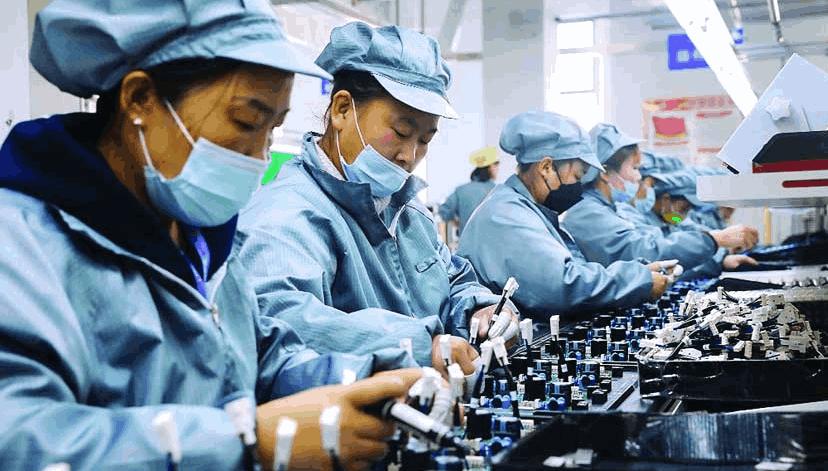09 Mar 2024 - {{hitsCtrl.values.hits}}
 The burst of the property bubble and the resulting debt crisis – more than three times the size of the US subprime crisis of 2008 - has already taken the fizz out of the Chinese economy. Beijing may be faced with fresh concerns if Donald Trump wins the US presidential election this year. Trump unleashed a tariff war against China in his first term. This time he is promising a 60% tariff on all Chinese imports. According to Bloomberg, such steep tariffs may cause serious damage to the $575 billion US-China trade.
The burst of the property bubble and the resulting debt crisis – more than three times the size of the US subprime crisis of 2008 - has already taken the fizz out of the Chinese economy. Beijing may be faced with fresh concerns if Donald Trump wins the US presidential election this year. Trump unleashed a tariff war against China in his first term. This time he is promising a 60% tariff on all Chinese imports. According to Bloomberg, such steep tariffs may cause serious damage to the $575 billion US-China trade.
The direct impact of Trump Tariff 2.0 will be felt on foreign investment in China. “Donald Trump’s previous tariffs did surprisingly little damage to China’s economy, but China may find it harder to shrug off the damage in a rematch. Mr Trump is threatening larger tariff increases if he is elected again. And the factors that cushioned the impact last time – currency depreciation and tariff evasion – would probably provide less protection. Another round of tariffs may also accelerate the still-nascent shift of production out of China,” London-based advisory Capital Economics said on February 23.
Trump is now leading the presidential race. According to a recent Bloomberg report, he has “won every nominating contest so far by wide margins, putting him on track to have enough delegates to lock down the Republican presidential nomination by mid-March.” However, China may have its share of worries, even if Trump does not win. Because the debate is adding pressure on President Joe Biden to take harsher trade measures against Beijing.
Being 'tough on China' is a proven vote catcher in the US. Trump’s rhetoric is adding pressure on Biden to up the ante. He may not go for a dramatic hike in duties to avoid a complete decoupling. However, he may add to the restrictions on the technology front, which is already hurting China. In October 2023, the Biden administration put restrictions sale of semiconductors by American companies to China. Analysts are now expecting Biden to go for the fresh restrictions.
Any such measure would not augur well for the Chinese economy which is now in a deflationary mode, indicating lack of demand. While export prospects are hit by restrictions and tariff walls; the domestic demand is failing to pick up, following the collapse of the real estate market. The collapse has cut both ways. At stake is 24% of the gross domestic product (GDP) and 70% of household savings.
The financial system is overstretched, both due to loan default by the property developers and the insolvency of the local governments who raised a mammoth $13 trillion in debt. Before the crisis, land sale to developers was the prime revenue source for local governments. As the revenue flow dried up, local governments became bankrupt. The stock market collapsed. Investors in Chinese stocks worldwide lost $7 trillion since 2021.
The turbulence has taken its toll on demand. China’s consumer prices slid deeper into deflationary territory. On a year-on-year basis, the consumer price index (CPI) dropped by 0.8% in January. It was the steepest fall since September 2009 and marks a fourth straight month of decline. Online publisher, Visual Capitalist predicted 1.9% inflation in China in 2024, lower than 2.6% in a recession-hit Japan. Visual Capitalist sourced core data from global agencies like the International Monetary Fund, Knight Frank etc.
To cut a long story short, the world economy has been on a slowdown since 2023 and may continue to remain so in 2024. But, the second largest economy is showing maximum vulnerability. And, all that are likely to convince foreign investors to downsize their presence in China. Relocation of investment to other geographies, if not in full then in parts, is a looming possibility. As Capital Economics predicted, the trend may consolidate in 2024.
Any such possibility will surely benefit India, where the economy is booming, stock indices doubled in the last five years, foreign portfolio investors are moving in great numbers, India's long-term bonds are in great demand, foreign direct investment is on an upswing, automobile sales are record high, inflation is estimated to remain a moderate 4.4% and, a strong government is likely to return to power for the third term in May-June this year. A host of investors, led by Apple Inc has already diversified its iPhone production lines to India. The flow is expected to rise once the election-related uncertainties are over. (The Asian Age)
26 Dec 2024 51 minute ago
26 Dec 2024 57 minute ago
26 Dec 2024 2 hours ago
26 Dec 2024 2 hours ago
26 Dec 2024 4 hours ago